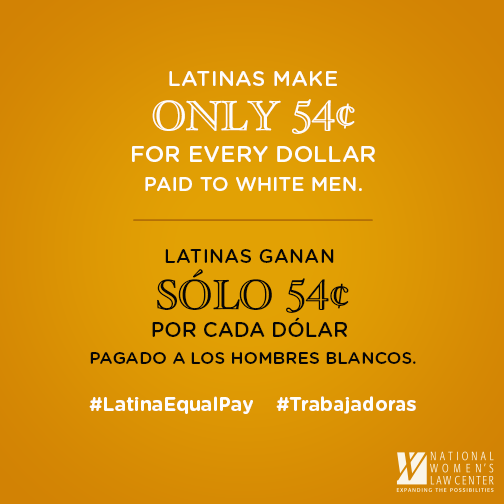This year, construction workers Bright Power formed one of the first ever unions to at a solar power company. But on Monday, the company fire the entire construction crew — in the middle of bargaining their first contract — and instead announced that they would be replaced by subcontractors. Unionized workers told Vice reporter Lauren Gurley that the mass firings were “obviously retaliation for union organizing,” arguing that the solar company’s union-busting resembled the infamously anti-union coal companies. Bright Power CEO Jeffrey Perlman informed the company that the union workers were fired because company resources were spread too thin, but according to Vice the firings “happened during a period of growth at the company.”
Wednesday was Latina Equal Pay Day, which marks the date into the year that Latinx women have to work to make up the pay disparity between them and white men in 2018. On average, women working full time earn just 82 cents on the dollar compared to men — but the gap is worse for women of color. Today, Latinas make just 54 cents on the dollar made by a white man, so Latina Equal Pay Day falls nearly 23 months into the year. According to a new analysis by the National Women’s Law Center, the wage gap costs Latinas on average $28,036 a year. If we fail to narrow the wage gap, a Latina worker would lose more than $1.1 million over a 40-year career.
A key House committee just passed the Farm Workforce Modernization Act, bipartisan legislation that would provide undoucumented workers a path to legal status “through continued agricultural employment,” according to Bloomberg News. The measured passed through the House Judiciary Committee 18-12, but only after the bill was amended to include increase employer verification processes.
A comprehensive new review of the effects of minimum wage raises on employment aims to put the debate to rest: wage increases cost almost no jobs, while significantly raising wages. The review was conducted by economist Arindrjat Dube and includes 55 estimates about the impact of raising the wage.
Postmastes forced thousands of workers to sign forced arbitration contracts waiving their right to sue. But after about 5,000 Postmates workers filed wage theft claims against the company, the gig company refused to pay for arbitrators to hear the claims — refusing to abide by the terms of the very same forced arbitration agreements they required their drivers to sign. Faced with the cost of arbitrating the dispute, Postmates is now attempting to settle the claims via class action — bolstering claims by workers’ advocates who argue that employers primarily used forced arbitration and class-action waivers to deter workers from bringing cases at all.






Daily News & Commentary
Start your day with our roundup of the latest labor developments. See all
February 17
San Francisco teachers’ strike ends; EEOC releases new guidance on telework; NFL must litigate discrimination and retaliation claims.
February 16
BLS releases jobs data; ILO hosts conference on child labor.
February 15
The Office of Personnel Management directs federal agencies to terminate their collective bargaining agreements, and Indian farmworkers engage in a one-day strike to protest a trade deal with the United States.
February 13
Sex workers in Nevada fight to become the nation’s first to unionize; industry groups push NLRB to establish a more business-friendly test for independent contractor status; and UFCW launches an anti-AI price setting in grocery store campaign.
February 12
Teamsters sue UPS over buyout program; flight attendants and pilots call for leadership change at American Airlines; and Argentina considers major labor reforms despite forceful opposition.
February 11
Hollywood begins negotiations for a new labor agreement with writers and actors; the EEOC launches an investigation into Nike’s DEI programs and potential discrimination against white workers; and Mayor Mamdani circulates a memo regarding the city’s Economic Development Corporation.